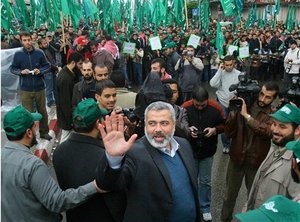UPDATES
Hamas on the Rise in the “Islamist Spring”?
July 27, 2012

Update from AIJAC
July 27, 2012
Number 07/12 #06
This Update features pieces covering the rising regional and financial clout of the Palestinian Islamist group Hamas as a result of the changes re-shaping the Middle East over the past eighteen months in what is sometimes called the “Arab Spring.”
First up is noted American Palestinian Affairs analyst Jonathan Schanzer, who focuses on the financial signs of Hamas’ growing clout compared to the Palestinian Authority (PA). He notes that while the PA is effectively broke, Hamas is riding high financially thanks to growing support from two new benefactors – Qatar and Turkey – despite the weakening of Hamas’ ties to traditional patrons Syria and Iran. He notes that even beyond this, Hamas is also now the “flavour of the month” in both Egypt and Tunisia, both traditional bastions of support for the PLO and later the PA. For his full exploration of the extent to which the nationalist PA has lost its mojo while Hamas steams ahead, CLICK HERE. As if to illustrate Shanzer’s point about the close Turkish-Hamas ties, Turkish PM Erdogan makes Hamas leader Khaled Meshaal his surprise guest at his first Iftar dinner of Ramadan – while refusing to meet Israeli diplomats.
Next up, veteran Israeli Arab affairs writer Khaled Abu Toameh also looks at the way neighbouring states, especially Egypt, but also Jordan, are increasingly embracing Hamas at the PA’s expense. He presents a whole litany of signals that the new Egyptian government is putting out that are clearly intended to indicate a close embrace of the Palestinian rejectionist group. He goes on to note that the PA seems completely on the outs – with “the heroes of ‘Arab Spring'” tending “to look at them as traitors and puppets in the hands of Israel and the US,” making the possibility of peace even more remote. For more from a man with expert inside knowledge of Palestinian politics, CLICK HERE.
Finally, American columnist Charles Krauthammer does a good job in explaining the context for Hamas’ regional success – the reality that the “Arab Spring” has become in fact an “Islamist Spring”. He notes that it is in fact Arab Nationalism which the revolutions everywhere attacked, and regardless of the prevalence of the mostly liberal and westernised hipster “Facebook” youth on television screens, it was no match for the “highly organized, widely supported, politically serious Islamists.” While he holds out some hope that Islamists will eventually adopt a more moderate model in the style of Turkey (while admitting the very considerable democratic shortcomings there), he concludes that it is time to face the reality “that Arab nationalism is dead and Islamism is its successor. For his argument in full, CLICK HERE.
Readers may also be interested in:
- Former Israeli UN Ambassador and academic Dore Gold looks critically at the narrative that says Israel’s presence in the West Bank must be understood as “occupation.” Plus, noted political science academic Michael Curtis revisits claims that settlements are the primary obstacle to peace.
- PA television features artwork depicting Israelis as monsters devouring Palestinian children. Plus some comment on this and other incitement from Abraham Cooper and Harold Brackman of the Simon Wiesenthal centre.
- Israel advances the PA NIS180 Million (A$43 million) to enable it to pay salaries in advance of Ramadan. Meanwhile, a World Bank report says the PA is not economically ready for statehood given its heavy reliance on foreign aid.
- Veteran Australian Jewish leader Isi Leibler comments on the missed opportunities in recent Israel political efforts to reform the military with respect to the Ultra-Orthodox minority.
- Itamar Marcus and Nan Jacques Zilberdik examine the past statement of the Egyptian Muslim Brotherhood leaders and conclude that maintaining long-term peace with Israel appears completely incompatible with their self-proclaimed religious beliefs.
- Bother American foreign policy pundit Walter Russell Mead and former AIJAC analyst and human rights lawyer Arsen Ostrovsky comment on the EU’s blinkered refusal to list Hezbollah as a terrorist organisation in the wake of the Bulgaria terror attacks last week.
- Some examples from the many stories and comments now appearing at AIJAC’s daily “Fresh AIR” blog:
- A post on the ugly scenes that erupted when an Egyptian “candid camera” type show convinced prominent Egyptians that they had been tricked into appearing on an Israeli TV show.
- A post on how the attack on Israeli tourist in Bulgaria last week underscores the absurdity of Israel’s exclusion from a new international counterterrorism forum.
- Daniel Meyerowitz-Katz in the Australian Jewish News on what everyone should know about Israel’s use of administrative detention.
- Andrea Nadel on the scandalous refusal of the International Olympic Committee to include a minute of silence at the Opening Ceremony of the London Games in memory of the 11 Israelis murdered by Palestinian terrorists at the 1972 Munich Olympics.
Hamas Rising
As the Palestinian Authority struggles to make payroll, the militant group is making friends and influencing leaders around the Arab world.
BY JONATHAN SCHANZER
Foreign Policy, JULY 25, 2012
Countries across the Middle East are opening their coffers to support the Palestinian cause — but the funds are increasingly being diverted in a direction that portends renewed conflict with Israel..
The U.S.-supported Palestinian Authority (PA), on the one hand, is rapidly heading for the poor house. Even after a promised $100 million injection of funds from the Saudis (which has not yet been delivered), the PA will still be suffering its worst cash crunch in years. It has an estimated budget shortfall of $1 billion for 2012 and has already stopped making payroll to its government employees. Yet regional leaders seem nonplussed about their longtime client’s budget woes; their pledges of support continue to go unfulfilled.
Meanwhile in the Gaza Strip, Hamas — the Islamist faction that violently wrested control of the area from the PA in 2007 — is riding high on the beneficence of its new allies. After a rocky period during which Iran’s largesse to Hamas dried up, and Syrian President Bashar al-Assad’s ongoing slaughter in Syria forced the group’s external leaders to flee from their headquarters in Damascus, the group has regained its footing.
Hamas has two of the Middle East’s emerging Sunni powerhouses to thank for its change of fortunes.
Qatar, despite an uneasy alliance with Washington that hinges on hosting a key U.S. airbase and now a new missile-defense station, has quietly become one of the Palestinian Islamist party’s most generous new benefactors. In February, Hamas officials announced they had signed a $250 million deal with the Qatari government for reconstruction projects in Hamas-controlled Gaza. Doha is also providing funds for sports and housing projects in the Gaza Strip, according to other media reports.
Perhaps the greatest beneficiary of Qatari support is Khaled Meshal, the head of Hamas’ external operations. As Assad’s crackdown on Syria’s predominantly Sunni opposition grew ever bloodier, Asharq al-Awsat reported in February that Meshal would leave Hamas headquarters in Damascus permanently and carry out his work from Qatar. Indeed, Qatar appears to be the new global headquarters of the Hamas politburo: A June 2012 Congressional Research Service report confirmed Meshal’s relocation to Doha, noting that the Gulf emirate is the place where he “conducts his regular engagement with regional figures.”
The Qataris also appear to be helping Hamas reintegrate into the Sunni fold. That’s a tall order, considering that Hamas had long been on the Iranian dole — the party is best known as an ally of the mullahs that has unleashed rocket attacks and suicide bombings across Israel, killing hundreds. But while the Iranian weapons pipeline still appears to be robust, known Iranian economic assistance has dwindled to small building projects — and Qatar is exploiting this window of opportunity. In late January, for example, Qatari Crown Prince Sheikh Tamim bin Hamad al-Thani accompanied a Hamas delegation to Jordan, the first time the group had made an official visit to Amman since Jordan’s King Abdullah expelled it in 1999.
Turkey’s Islamist government has also embraced Hamas, both economically and diplomatically. In December, the International Middle East Media Center, run out of the West Bank town of Beit Sahour, cited Turkish sources claiming that Turkish Prime Minister Recep Tayyip Erdogan had “instructed the Ministry of Finance to allocate $300 million to be sent to Hamas’ government in Gaza.” Hamas denied this, but Reuters and the Israeli newspaper of record, Haaretz, published subsequent reports, citing different sources, confirming this financial relationship.
It is in Ankara’s interest to keep direct assistance shrouded in secrecy — after all, it has a reputation to uphold among its NATO allies, who designated Hamas for its terrorist activity. But other Turkish assistance to Gaza is easier to document. In January, for instance, the Turkish daily Hurriyet reported that the country would “help Palestinians in the Gaza Strip repair mosques,” while its competitor, Zaman, quoted Turkish officials confirming that the country is “engaged in projects to deliver humanitarian aid to Gaza,” including the construction of a $40 million hospital.
Turkey, like Qatar, has also been an advocate of Hamas in the diplomatic arena for several years now. The ill-fated Turkish-led flotilla of 2010, after all, was designed to draw attention to the Israeli siege of Gaza and received government sponsorship. And Erdogan famously told an American television audience last year, “I don’t see Hamas as a terror organization. Hamas is a political party.”
Erdogan is not alone in his sentiments. The political tide across the Middle East is also highly favorable to Hamas. Most obviously, the victory of the Muslim Brotherhood’s Mohamed Morsy in Egypt’s presidential elections has energized Hamas. Following the Brotherhood’s victory, Haniyeh expressed confidence that “the revolution led by Morsy will not take any part in blocking Gaza” — a reference to the blockade enforced by fallen dictator Hosni Mubarak.
The Palestinian Islamist group also enjoyed a red-carpet welcome in Tunisia, where the Islamist al-Nahda party has taken the reins of power. This was a particularly galling development for the rival West Bank government, given that the Palestine Liberation Organization (PLO), the Palestinian nationalist organization that Yasser Arafat founded and Abbas now heads, had previously used Tunis as its headquarters in exile.
With Islamist movements gaining strength across the region, Hamas’s political rival has simply lost its mojo. The Palestinian Authority, created 18 years ago to midwife a two-state solution with Israel that has yet to materialize, is sorely lacking in popular appeal. It doesn’t help that the PA earned a reputation for being corrupt and ossified — two qualities that brought several Arab autocracies to their ends.
The PA’s Western allies, meanwhile, are becoming less willing to underwrite its activities. Despite a denial issued by the PLO to Foreign Policy, Saudi, Palestinian, and Israeli sources have reported that the White House is indeed threatening to cut aid if Abbas attempts to pursue recognition of Palestinian statehood again at the United Nations this year.
Hamas, unlike the PA, has never needed Western handouts. Since its inception in 1987, the group has operated entirely on regional cash. And despite its recent fallout with Iran and Syria, its platform of resistance to Israel enjoys wide appeal in the new Sunni regional order.
Washington once had the clout to deter countries like Qatar, Turkey, and Egypt from backing a designated terrorist group. But after the great regional tectonic shifts of the past two years, U.S. consternation has become a secondary consideration for these new governments.
True, Hamas’s new donors could moderate its politics. This is certainly the line that Turkey and Qatar will take. But more likely, the increased cash flow to Hamas will herald a new wave of rejectionism and — given Hamas’s track record — possibly a new wave of violence in the Palestinian-Israeli conflict.
Jonathan Schanzer is vice president for research at the Foundation for Defense of Democracies and author of Hamas vs Fatah: The Struggle for Palestine.
————————————————————————
Arab Spring: A Blessing for Hamas
by Khaled Abu Toameh
Gatestone Institute, July 25, 2012 at 5:00 am
Hamas has good reason to be extremely happy with the “Arab Spring” that has been sweeping the Arab world for nearly two years: thanks to the “Arab Spring,” Hamas leader Khaled Mashaal has, for the first time ever, entered the Presidential Palace in Cairo.
Until recently, Mashaal and other Hamas leaders were considered personae non gratae [unwelcome people] in both Jordan and Egypt.
Mashaal was ousted from Syria earlier this year because he refused to support Bashar Assad in his confrontation with the opposition, which is mostly dominated by Islamists. But Mashaal knows that it is only a matter of time before the “Arab Spring” sees Islamists take control over Syria, enabling him to become a welcome guest in the presidential palace in Damascus.
Last week, however, Mashaal was invited to a meeting with newly elected Muslim Brotherhood candidate Mohamed Mursi in the Palace of Ittihadiyah in the Egyptian capital.
Mashaal was the first Hamas representative ever to enter the palace. Prior to the downfall of Hosni Mubarak’s regime, Mashaal and other Hamas leaders could only dream of the day when they would be received by an Egyptian president in his palace.
But the “Arab Spring,” which had been hijacked by Muslim Brotherhood and other Islamist groups in Tunisia and Egypt, has so far proven to be a blessing for Hamas, an offshoot of the Muslim Brotherhood, and now seeking to reap the fruits of the rise of Islamists to power in the Arab world.
Mashaal was invited to the Al-Ittihadiyah Palace one day after his rival, Palestinian Authority President Mahmoud Abbas, met with the new Egyptian president.
By meeting separately with Mashaal and Abbas, Mursi has created the impression that the Palestinians have two legitimate leaders. Even more, Mursi has put Mashaal on an equal footing with heads of state, thus granting legitimacy not only to the Hamas leader, but to his entire movement.
Also last week, the new Egyptian president surprised many Palestinians when he personally phoned a top Hamas official who had just been released from Israeli prison to offer his greetings.
Even the Hamas official, Abdel Aziz Dweik, expressed surprise at the phone call from the president of the largest Arab country.
According to Hamas sources, Mursi is also expected to meet soon with Hamas Prime Minister, Ismail Haniyeh, who has also been officially invited to the presidential palace in Cairo.
In a move that is expected to further embolden Hamas and tighten its grip on the Gaza Strip, Mursi is said to have promised the Islamist movement to ease travel restrictions imposed on residents of the Gaza Strip
Another Arab leader who seems to be aware of the growing power of the Islamists in the Arab world is Jordan’s King Abdullah.
Jordan’s Muslim Brotherhood organization has already created enough trouble for the monarch. Exploiting demands for reform and democracy inspired by the “Arab Spring,” some Muslim Brotherhood leaders and members are now working to undermine King Abdullah with the ultimate goal of turning the kingdom into an Islamist emirate.
The king is so worried that he recently invited Khaled Mashaal to his palace in Amman and asked him to use his good offices with Muslim Brotherhood to calm things down. King Abdullah is particularly concerned about calls by Muslim Brotherhood and other opposition groups to boycott parliamentary elections later this year.
The fact that the Jordanian king has to seek Hamas’s help in restraining Muslim Brotherhood is a sign of the Islamist movement’s increased influence in wake of the “Arab Spring.”
While the “Arab Spring” has strengthened Hamas, it has at the same time dealt a severe blow to less radical Palestinians such as Mahmoud Abbas and Salam Fayyad.
Unless Abbas and Fayyad become members of Muslim Brotherhood or Hamas, the heroes of “Arab Spring” will continue to look at them as traitors and puppets in the hands of Israel and the US. The rising power of Hamas makes any talk about a peace process sound like a joke.
Back to Top
————————————————————————
The Islamist ascendancy
By Charles Krauthammer
Washington Post, July 12
Post-revolutionary Libya appears to have elected a relatively moderate pro-Western government. Good news, but tentative because Libya is less a country than an oil well with a long beach and myriad tribes. Popular allegiance to a central national authority is weak. Yet even if the government of Mahmoud Jibril is able to rein in the militias and establish a functioning democracy, it will be the Arab Spring exception. Consider:
Tunisia and Morocco, the most Westernized of all Arab countries, elected Islamist governments. Moderate, to be sure, but Islamist still. Egypt, the largest and most influential, has experienced an Islamist sweep. The Muslim Brotherhood didn’t just win the presidency. It won nearly half the seats in parliament, while more openly radical Islamists won 25 percent. Combined, they command more than 70 percent of parliament — enough to control the writing of a constitution (which is why the generals hastily dissolved parliament).
As for Syria, if and when Bashar al-Assad falls, the Brotherhood will almost certainly inherit power. Jordan could well be next. And the Brotherhood’s Palestinian wing (Hamas) already controls Gaza.
What does this mean? That the Arab Spring is a misnomer. This is an Islamist ascendancy, likely to dominate Arab politics for a generation.
It constitutes the third stage of modern Arab political history. Stage I was the semicolonial-monarchic rule, dominated by Britain and France, of the first half of the 20th century. Stage II was the Arab nationalist era — secular, socialist, anti-colonial and anti-clerical — ushered in by the 1952 Free Officers Revolt in Egypt.
Its vehicle was military dictatorship, and Gamal Nasser led the way. He raised the flag of pan-Arabism, going so far as changing Egypt’s name to the United Arab Republic and merging his country with Syria in 1958. That absurd experiment — it lasted exactly three years — was to have been the beginning of a grand Arab unification, which, of course, never came. Nasser also fiercely persecuted Islamists — as did his nationalist successors, down to Egypt’s Hosni Mubarak and the Baathists, Iraqi (Saddam Hussein) and Syrian (the Assads) — as the reactionary antithesis to Arab modernism.
But the self-styled modernism of the Arab-nationalist dictators proved to be a dismal failure. It produced dysfunctional, semi-socialist, bureaucratic, corrupt regimes that left the citizenry (except where papered over by oil bounties) mired in poverty, indignity and repression.
Hence the Arab Spring, serial uprisings that spread east from Tunisia in early 2011. Many Westerners naively believed the future belonged to the hip, secular, tweeting kids of Tahrir Square. Alas, this sliver of Westernization was no match for the highly organized, widely supported, politically serious Islamists who effortlessly swept them aside in national elections.
This was not a Facebook revolution but the beginning of an Islamist one. Amid the ruins of secular nationalist pan-Arabism, the Muslim Brotherhood rose to solve the conundrum of Arab stagnation and marginality. “Islam is the answer,” it preached and carried the day.
But what kind of political Islam? On that depends the future. The moderate Turkish version or the radical Iranian one?
To be sure, Recep Erdogan’s Turkey is no paragon. The increasingly authoritarian Erdogan has broken the military, neutered the judiciary and persecuted the press. There are more journalists in prison in Turkey than in China. Nonetheless, for now, Turkey remains relatively pro-Western (though unreliably so) and relatively democratic (compared to its Islamic neighborhood).
For now, the new Islamist ascendancy in Arab lands has taken on the more benign Turkish aspect. Inherently so in Morocco and Tunisia; by external constraint in Egypt, where the military sees itself as guardian of the secular state, precisely as did Turkey’s military in the 80 years from Ataturk to Erdogan.
Genuinely democratic rule may yet come to Arab lands. Radical Islam is the answer to nothing, as demonstrated by the repression, social backwardness and civil strife of Taliban Afghanistan, Islamist Sudan and clerical Iran.
As for moderate Islamism, if it eventually radicalizes, it too will fail and bring on yet another future Arab Spring where democracy might actually be the answer (as it likely would have been in Iran, had the mullahs not savagely crushed the Green Revolution). Or it might adapt to modernity, accept the alternation of power with secularists and thus achieve by evolution an authentic Arab-Islamic democratic norm.
Perhaps. The only thing we can be sure of today, however, is that Arab nationalism is dead and Islamism is its successor. This is what the Arab Spring has wrought. The beginning of wisdom is facing that difficult reality.
Tags: Middle East





